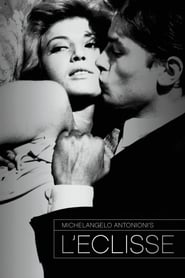
L”Eclisse, is considered the third part of Michelangelo Antonioni’s trilogy about modern life. It was preceded by,” L’Adventura”, that dealt with the emptiness of bourgeoisie life and ” La Notte”, which concerned the difficulty in retaining love in a long term relationship. “L’Eclisse” begins at the end of one such relationship, although it is not quite clear how long that relationship actually lasted and what the reasons were for its breaking point.
The ravishing Monica Vitti portrays Vittoria who we see at the start of the film finalizing a bitter breakup with her intellectual boy friend. The conversation between the two revolves upon an intense situation that is never clear. At the end of the night long conversation, the boyfriend tries to convince her to stay until she finally admits that she has fallen out of love..
This may be Antonioni’s bridge from, La Notte”, whereby he went into great pain in delving deeply into the reasons people fall out of love.
From there Vittoria is driven to meet her stock investing mother and witnesses said mother first not really caring to listen to her daughter and then, almost as a punishment losing most of her savings to a crashed stock. At the stock exchange she also meets and is smitten with Piero (the French heart throb Allan Delon). Piero is smitten with Vittoria resulting in his following her throughout the next few days. Vittoria may be ready for a short rebound to her breakup and Piero is a constant chaser of skirts.
Something as seemingly sweet and innocent as this meeting of souls at a certain time in their lives would make for a wonderful Hollywood comedy drama or romantic tear jerker. However in the hands of Antonioni it becomes something quite different. Through beautiful scenes of passion that focuses on the gorgeous faces of the protagonists, Antonioni succeeds in portraying a deep felt feeling of two souls wondering though a moving world. His camera never loses site of its location, whether it is on the suburbs and streets of Rome, in a secluded office or inside a well to do residential home.
Vitti has never been more ravishing then in this film. Antonioni’s camera allows her to almost glow within the prism of the story. The movie is filled with small hints of the struggle between left and right politics that allow it to veer away from the main story for no apparent reason. These distractions actually enhance the interest in the simple story.
An example is the scene where Vittoria decides to follow a man who just lost a fortune in the stock crash, only to see him gently walk into a café to drink bottled water and draw flowers on a napkin. I kept thinking that this is what someone does before he decides to commit suicide. We are never given any insights as to what actually happens to this man as he is quickly forgotten in the plot.
In another plot twist Vittoria is invited to spend the evening at the house of a neighbor whose family owns plantations in Africa. There is no real purpose to this plot twist other than to emphasize the basic racism at the core of colonialism. The movie is showing us the world as it existed in the eyes of the director, while at the same time focusing on the angst and desires of two beautiful people.
The movie’s ending is as shocking to modern movie going audiences as it is beautiful with its focused photography and emphasis on all that occurred before it. This is not a regular movie and deserves the patience required to truly enjoy it.

